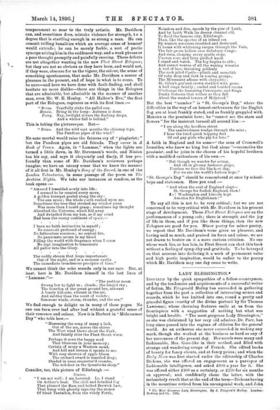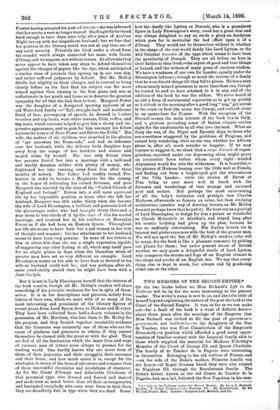LADY BLESSINGTON.*
INSPIRED by the quick sympathies of a fellow-countryman, and by the tendencies and acquirements of a successful writer of fiction, Mr. Fitzgerald Molloy has succeeded in gathering together from the past a collection of interesting scenes and records, which he has knitted into one, round a pretty and graceful figure (worthy of the divine portrait by Sir Thomas Lawrence), whose charming features smile at ne from the frontispiece with a suggestion of nothing but what was bright and lovable. "The most gorgeous Lady Blessington," as she was christened by her very old admirer, Dr. Parr, has long since passed into the regions of oblivion for the general world. As an authoress she never succeeded in making any mark, though she worked at the business as hard as any of her successors of the present day. Her novels were many and fashionable, Mrs. Gore-like in their method, and filled with strange and wandering scraps of French. She edited books of beauty for fancy clients, and at fancy prices; and when the Daily News was first started under the editorship of Charles Dickens, she was offered an engagement as a purveyor of fashionable intelligence, and asked 2800 a year for it. She was offered either 2414)0 as a certainty, or 2250 for six months on approval ; and confidently chose the latter, with the melancholy result that at the end of the term—Dickens having in the meantime retired from his unriongenial work, and John • The NM Gorgeous Lady Blessington. By J. Fitzyers'd Molloy. London: Downey and Co. 1896.
Forster having accepted his post ad interim—she was informed that her services were no longer wanted. Shefought for her hand bard enough in later days, poor lady, after years of Arabian Night luxury with her magnificent husband; but we fear that her position in the literary world was not at any time one of any solid security. Privately she lived under a cloud from the scandal which always connected her name with Count d'Orsay, and, we suppose, not without reason. At all events they never appear to have taken any steps to defend themselves against the charges of papers like the Age, which anticipated a similar class of journals that sprang up in our own day, and rather Buffered judgment by default. But Mr. Molloy dwells but slightly on these charges, and is content to bring clearly before us the fact that his subject was far more sinned against than sinning in the first place, and was so unfortunate in her youth and home as to deserve the greatest sympathy for all that she had then to bear. Margaret Power was the daughter of a dissipated sporting squireen of an old Watel ford family :—" Tall, straight-built and handsome, florid of face, peremptory of speech, he dressed in Lather breeches and top-boots, wore white cravats, frills, ruffles, and top seals, which costume helped to give him a showy and im- pressive appearance, and to gain for him amongst his fellow squires the names of Beau Power and Shiver the Frills." His wife, the mother of six children, was absorbed in the glories of "me ancestors the Desmouds," and had no influence over her husband, while the delicate little daughter kept away from the romps of her brothers and sisters and moped alone by herself. She was only fifteen when bet' parents forced her into a marriage with a half-mad and wholly drunken soldier with plenty of money, who frightened her into running away from him after three months of misery. Her father had readily turned Pro- testant in order to become a Magistrate for the county, in the hopes of redeeming his rained fortunes, and poor Margaret was married by the rites of the "United Church of England and Ireland." Driven into a still more equivocal life by her impossible position at home after she left her husband, Margaret was still under thirty when she became the wife of Lord Blessington, a brilliant and generous lord of the picturesque order, who had brought thirty thousand a year down to two-thirds of it by the date of this his second marriage, and received her in his residence at Mountjoy Forest as if she bad been an Eastern Queen. Throughout her life she seems to have been bat a sad woman in her vein of thought and manner ; but her attachment to her husband seems to have been very genuine. In none of her letters to him or about him does she use a single expression capable of suggesting any other feeling at all, which may itself pass for no slight praise in days when the blameless wives of greater men have set so very different an example. Lord Blessington seems on his side to have been as devoted to his wife as husband could well be ; and was perhaps, after all, more comfortably mated than he might have been with a Jane Carlyle.
But it is not in Lady Blessington herself that the interest of the book centres, though all Mr. Molloy's readers will share something of his patriotic weakness for her in spite of them- selves. It is in the descriptions and pictures, mainly from letters of their own, which we meet with of so many of the most interesting and prominent of the literary figures of recent years, from Lord Byron down to Dickens and Ms rryat. They have been collected from half.a-dozen volumes in the possession of Mr. Morrison, who lent them to Mr. Molloy for the purpose, and they furnish together irresistible evidence that the Countess was eminently one of those who are the cause of gladness and greatness in others, if they cannot themselves be classed with the great or with the glad. They are full of all the fascination which the inner lives and ways of eminent men of letters seem always to possess for the reading world. One hardly knows why one never tires of them, of their jealousies and their struggles, their successes and their fears ; and how much easier it is, except for the strategist, to weary of the lives of adventure and romance than of these uneventful chronicles and revelations of character. As for the Count d'Orsa.ys and Admirable Crichtons of that perennial type, who dressed and fenced and danced and made love so much better than all their co-temporaries, and fascinated everybody who came near them in their lives, they are dreadfully dull in type when they are dead. Some- how the dandy like Lytton or Disraeli, who is a prominent figure in Lady Blessington's story, owed her a great deal and was always delighted to say so, sheds a glory on dandyism which goes far to neutralise the bad effect upon it of a d'Orsay. They would not be themselves without it, whether in the shape of the real-world dandy like Lord Lytton, or the wild Oriental travestie of the type which seems to have been the peculiarity of Disraeli. They are all before us here in their habits as they lived,—the sayers of good and true things at hazard, and the writers of many gems of careless wisdom. We have a weakness of our own for Landor, equally under the Blessington influence, though so much the reverse of a dandy that he wore his old things till they fell to pieces. He was a man who so nearly missed greatness in more lines than one, though he cannot be said to have attained to it in any, and of the oddities of the book he was the oddest. We never beard of so odd a form of matrimonial separation as to get up quietly at 4 o'clock in the morning after a good long "nag," get across to the coast on foot (the scene was Jersey), and embark alone in an oyster-boat for France. With the exception of the Disraeli scenes, the main interest of the book lies in Italy, and a glorious pervading sense of Italian climate excites sighs for the unattainable in all who love the land. What an Italy she was, of the Papal and Byronic days, to those who are sometimes staggered by the problems of Progress, and cannot help wondering, slave as she was, whether her African phase is, after all, much sounder or happier. If we may venture to suggest it, we think that a corps d'armee of organ. grinders, recruited under our depressing skies, might prove an irresistible force before whom every right - minded Abyssinian would flee into the wilderness. It is beautiful,— the picture of Dickens leaning over the little wall at Fiesole, and finding out from a bright-eyed girl the whereabouts of the Villa Landor ; while the stories of Byron at Pisa bring us once more well in touch with the fortunes and wanderings of that strange and untamed poet and outlaw. But perhaps the most entertaining of all the lady's intimates and protégés was Charles Mathews, afterwards so famous an actor, but then studying architecture (another way of drawing houses, as Mr. Molloy does not perhaps know that he put it). He went out as a protégé of Lord Blessington, to design for him a palace as wonderful as Claude Melnotte's or Aladdin's, and stayed long after his erratic lordship had given up the plan, because he was so endlessly entertaining. His Italian letters vie in interest and picturesqueness with the best of the greater men. We will not spoil the fun of Mr. Molloy's readers (who will be many, for the book is like a pleasant romance) by picking out plums for them ; but under present stress of British weather we may quote a delightful simile of Lord Lytton, who compares the storms and fogs of an English climate to the chops and steaks of an English inn. We say that every- thing else is kept in stock, but always end by producing either one or the other.







































 Previous page
Previous page